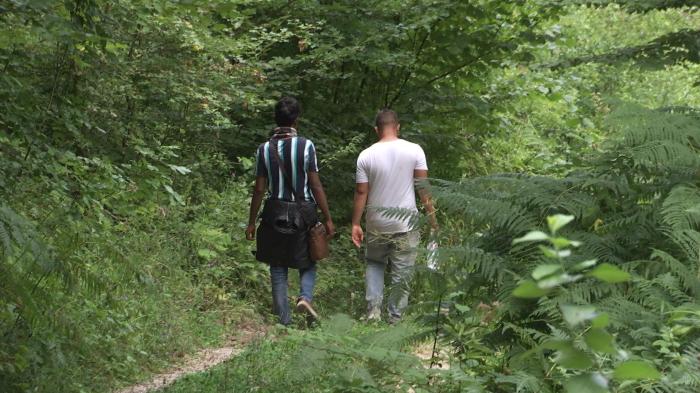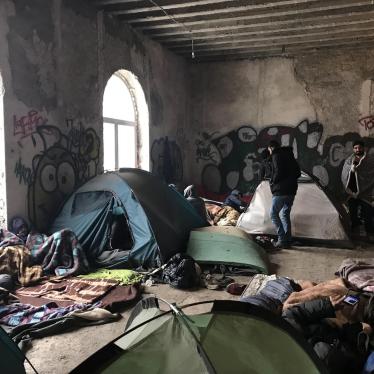(Budapest) – The European Commission’s October 22, 2019 conclusion that Croatia is ready to join the Schengen Area wilfully brushes over evidence of violent pushbacks of migrants at its borders, Human Rights Watch said today in releasing a video documenting the abuses.
The European Commission’s action sends the message that serious human rights abuses are no obstacle to Schengen accession. The European Commission should investigate the situation instead of rewarding Croatia.
“Croatia’s unlawful and violent summary returns of asylum seekers and migrants should disqualify it from joining the Schengen Area,” said Lydia Gall, senior Eastern Europe and Balkans researcher at Human Rights Watch. “Ignoring Croatia’s abuses of migrants at its borders makes the notion that Schengen membership is contingent on respect for human rights just meaningless talk.”
The Human Rights Watch video features interviews with people shortly after they were summarily returned to Bosnia by Croatian police in August. It includes interviews with other pushback victims and witnesses of pushbacks, including the mayor of Bihac, a Bosnian town across the border from Croatia. It also shows credible secretly recorded footage of Croatian police officers escorting groups of migrants across the border to Bosnia and Herzegovina without following due process.
In its assessment, the European Commission acknowledges that denying potential asylum seekers access to the asylum procedure and allegations of use of force by Croatian law enforcement officials remain a challenge. It concludes, however, that the creation of a system to monitor Croatian border guards’ actions and the Croatian government’s promises to investigate allegations are sufficient to conclude that Croatia has done enough “to fulfil its commitment in relation to the protection of human rights.”
The summary return of asylum seekers without consideration of their protection needs is contrary to European Union asylum law, the EU Charter of Fundamental Rights, and the 1951 Refugee Convention.
Human Rights Watch has documented summary collective expulsions from Croatia to Serbia and Bosnia and Herzegovina since 2016. In some instances, Croatian border officials have used force, pummeling people with fists, kicking them, and making them run gauntlets between lines of police officers. Violence has been directed against women and children. Unlike with lawful deportations, migrants are not returned at ports of entry, but rather in remote border areas, including, at times, forced to cross freezing streams.
The United Nations High Commissioner for Refugees (UNHCR), the Council of Europe’s Human Rights Commissioner, and other nongovernmental organizations have echoed Human Rights Watch concerns. Although President Kolinda Grabar-Kitarovic in July acknowledged that authorities engage in pushbacks, Croatian authorities have repeatedly denied the allegations, including to Human Rights Watch, and in some cases have accused aid groups and victims of fabricating facts to make Croatian police look bad.
Croatian authorities have not taken credible steps to halt the practice and to hold those responsible to account, Human Rights Watch said. In a meeting with Human Rights Watch in May, the Interior Ministry state secretary, Terezija Gras, said the Croatian police would investigate any complaints filed by migrants about police mistreatment but could not say how many complaints the authorities had received. Nor could she explain how a migrant pushed back from Croatia to Bosnia and Herzegovina would be able to a file a complaint with the authorities in Croatia.
To join the Schengen area – where 22 EU member states and 4 non-EU countries have effectively abolished border and passport controls – member states have to fulfil certain criteria set out in EU law, including respect for the right to seek asylum. The EU Schengen Borders Code Article 4 says that member states should act in compliance with EU law and “obligations related to access to international protection, in particular the principle of non-refoulement [banning the return to a country where they would face torture, cruel, inhuman and degrading treatment or other irreparable harm] and fundamental rights.” Pushbacks effectively preventing people from accessing the Croatian asylum procedure violate Article 4.
Before using the European Commission’s report to approve Croatia’s full access to Schengen, the European Council should call for a reassessment of Croatia’s compliance with the EU Schengen Borders Code. It should press Croatia to demonstrate concrete progress by putting in place an independent and effective monitoring mechanism and require evidence of thorough investigations of summary returns of migrants and asylum seekers at its borders and allegations of Croatian guards using violence against them. The Commission should also initiate legal enforcement action against Croatia for violating EU laws, Human Rights Watch said.
“Letting Croatia join Schengen when migrants and asylum seekers continue to be brutally pushed back would be an EU green light for abuses,” Gall said. “The European Commission should not just accept Croatia’s empty promises, but ensure that Schengen criteria are truly met, which is clearly not happening now.”










